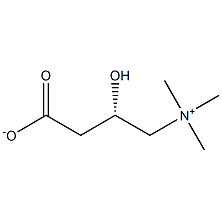
CAS No.: 541-15-1 Formula: C7H15NO3
Weight: 161.2
Synonyms: L-(-)-Carnitine; 3-Hydroxy-4-(trimethylammonio)butanoate; Vitamin BT; L-Carnitine; Levocarnitinep; L-Carnitine Base; (D)L-Carnitine;
Carnitine is one of the B vitamins, and its structure is like an amino acid, so some people classify it as an amino acid. Its main role is to help transport long-chain fatty acids for energy. This prevents fat from accumulating in the heart, liver and skeletal muscle. Artificially synthesized carnitine has three forms: levorotatory, dextrorotatory and racemic, and the effect of L-carnitine is better. L-carnitine is a compound with a variety of physiologically active functions. Its main function is to promote β-oxidation of fatty acids; it can also regulate the ratio of acyl groups in mitochondria and affect energy metabolism; L-carnitine can participate in the metabolism of branched-chain amino acid metabolites. transport, thereby promoting the normal metabolism of branched-chain amino acids. In addition, L-carnitine plays a role in the elimination and utilization of ketone bodies, and can be used as a biological antioxidant to scavenge free radicals, maintain the stability of membranes, improve the immunity of animals and the ability to resist disease and stress.